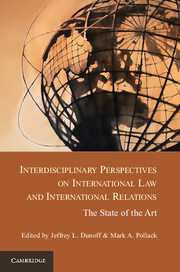 Interdisciplinary Perspectives on International Law and International Relations
Interdisciplinary Perspectives on International Law and International Relations Published online by Cambridge University Press: 05 January 2013
Judicial independence strikes at the heart of what is different about a world with international courts (ICs). International courts have issued more than thirty thousand legally binding judgments (Alter 2013). Yet, if international judges were simply “diplomats in robes,” then these judgments would be unlikely to result in noticeable changes in the policies and practices of states, even if compliance were perfect.
There is a scholarly consensus that most international courts enjoy a degree of autonomy within a defined sphere. The literature refers to this alternately as “constrained independence” (Helfer and Slaughter 2005), “bounded discretion” (Ginsburg 2005), or the “strategic space” (Steinberg 2004) within which international judges can freely operate. There is, however, little agreement on who or what defines the bounds of this sphere or how wide it is or should be. Some argue that the effective control that states exercise over judges is so minute that international judges should properly be considered “trustees” (Majone 2001; Alter 2008). Others question the degree to which ICs do or should enjoy independence (Posner and Yoo 2005; Carrubba, Gabel, and Hankla 2008). Moreover, there are theoretical debates about why ICs acquired the independence that they did.
To save this book to your Kindle, first ensure no-reply@cambridge.org is added to your Approved Personal Document E-mail List under your Personal Document Settings on the Manage Your Content and Devices page of your Amazon account. Then enter the ‘name’ part of your Kindle email address below. Find out more about saving to your Kindle.
Note you can select to save to either the @free.kindle.com or @kindle.com variations. ‘@free.kindle.com’ emails are free but can only be saved to your device when it is connected to wi-fi. ‘@kindle.com’ emails can be delivered even when you are not connected to wi-fi, but note that service fees apply.
Find out more about the Kindle Personal Document Service.
To save content items to your account, please confirm that you agree to abide by our usage policies. If this is the first time you use this feature, you will be asked to authorise Cambridge Core to connect with your account. Find out more about saving content to Dropbox.
To save content items to your account, please confirm that you agree to abide by our usage policies. If this is the first time you use this feature, you will be asked to authorise Cambridge Core to connect with your account. Find out more about saving content to Google Drive.